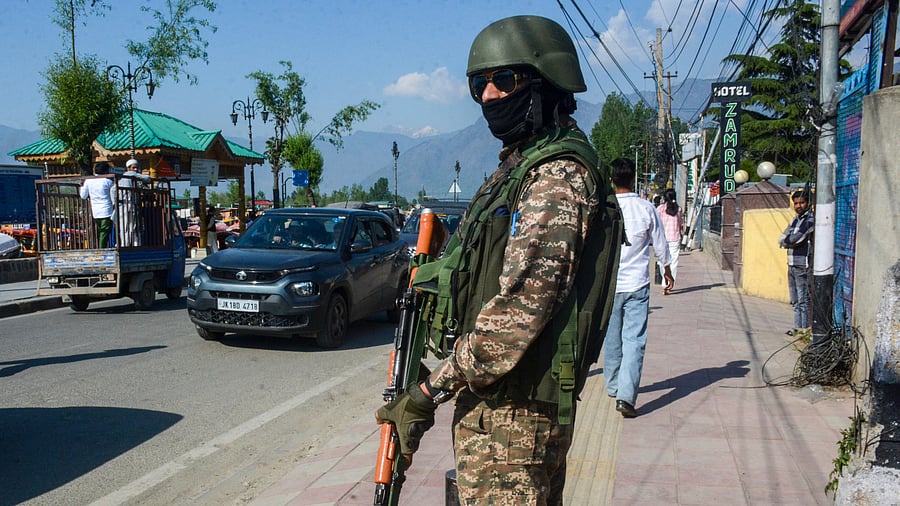
A security official stands guard at Boulevard Road, in the aftermath of the Pahalgam terrorist attack, in Srinagar, Jammu and Kashmir, Sunday, April 27, 2025.
Credit: PTI Photo
Srinagar: As Kashmir continues to reel from the Pahalgam terror attack that claimed 26 lives, a significant political development quietly unfolded on Sunday. Leaders affiliated with the banned Jamaat-e-Islami (JeI) launched a new political party — the Justice and Development Front (JDF).
The JDF, positioning itself as a mainstream political force, was formally launched at a low-key event in Srinagar, with an eye to contest the upcoming municipal and urban local bodies elections in Jammu and Kashmir.
Shamim Ahmad Thoker, who was appointed the party’s first president, in his address, condemned the brutal attack at Pahalgam and also criticised the harassment of Kashmiris in different states following the massacre.
He said the JDF “supports the action of the country within the parameters of justice” in response to the massacre but appealed to Prime Minister Narendra Modi to review the policy of demolishing houses of active militants in Kashmir.
Since the Pahalgam attack, security forces have razed several houses linked to militants by using explosives. However, the police have not officially commented on these demolitions.
Jamaat, a socio-political and religious organisation, was banned by the central government in 2019 over alleged ties to militant outfits. Since then, the group had maintained a low profile. Yet, during last year’s assembly elections, several Jamaat-affiliated leaders contested quietly as independents. Among them were senior Jamaat leaders Sayyar Ahmad Reshi and Talat Majid from south Kashmir, though none succeeded at the polls.
Historically, from 1989 until 2019, Jamaat and separatist groups had boycotted elections in Kashmir, often organising rallies urging people not to vote. The participation of Jamaat-backed candidates last year signalled the organisation’s unofficial return to electoral politics after 37 years.
Jamaat had previously participated in the 1987 elections as part of the Muslim United Front (MUF), an anti-National Conference–Congress alliance, which later alleged widespread rigging — a grievance that fuelled the eruption of insurgency in 1989.
Political observers view the launch of the JDF as an attempt by former Jamaat members and sympathisers to re-enter the political mainstream under a new identity, amid continued scrutiny of separatist activities in the Valley.
With Kashmir still mourning the Pahalgam massacre, the emergence of JDF adds a new and delicate layer to the Valley’s already volatile political landscape. Security agencies are expected to closely monitor the party’s activities in the days ahead.